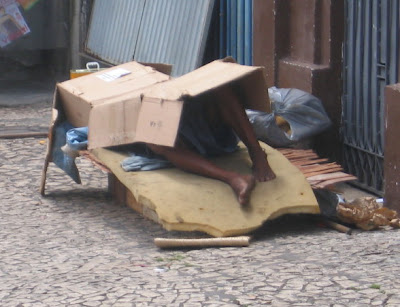Tristeza não tem fim
Felicidade sim
A felicidade é como a pluma
Que o vento vai levando pelo ar
Voa tão leve
Mas tem a vida breve
Precisa que haja vento sem parar
(La tristeza no tiene fin
La felicidad sí
La felicidad es como una pluma
Que el viento lleva por el aire
Vuela tan ligera
Pero tiene vida breve
Requiere que haya viento sin parar)
It's Christmas and we're away from home. I mean, our various homes. Even though I don't buy any of it, I can't help but feeling a little bit sad. I´ve realized lately that Brazilian songs I've been listening to since the beginning of times have beautiful lyrics. Full of saudade, in many cases. Like Felicidade (Happiness):Felicidade sim
A felicidade é como a pluma
Que o vento vai levando pelo ar
Voa tão leve
Mas tem a vida breve
Precisa que haja vento sem parar
(La tristeza no tiene fin
La felicidad sí
La felicidad es como una pluma
Que el viento lleva por el aire
Vuela tan ligera
Pero tiene vida breve
Requiere que haya viento sin parar)
Es Navidad y estamos lejos de casa. De nuestras varias casas, quiero decir. Aunque me importa un pepino todo esto, no puedo evitar sentirme un poco triste. Últimamente me he dado cuenta de que algunas canciones de bossa nova que llevo escuchando toda la vida tienen letras preciosas. Llenas de saudade, en muchos casos. Como Felicidade (Felicidad):
It's OK if you don't understand the lyrics. Just listen to it and send us good vibes. I'm doing the same. Merry Christmas.
No importa si no entiendes lo que dice (eso de que el español y el portugués son muy parecidos es un camelo). Escúchala y envíanos buenas vibraciones. Yo ya lo estoy haciendo. Feliz Navidad.















































